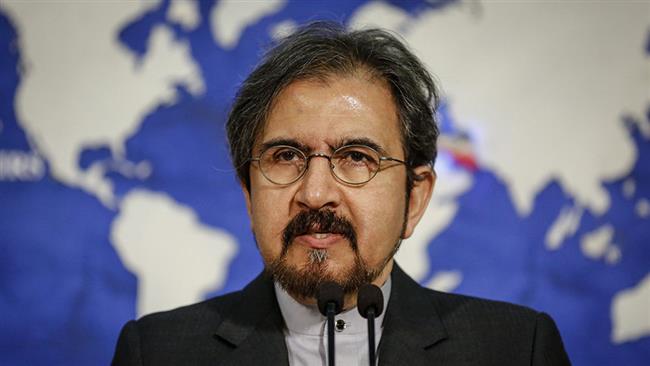
RNA - "The Arab League's statement was not as incisive as it was expected," Foreign Ministry Spokesman Bahram Qassemi said on Monday at a press conference, adding, "The statement was not proportionate to the [issue of the] Palestinian cause."
The US president on Wednesday defied global warnings and said Washington formally recognized Jerusalem al-Quds as the “capital” of Israel and would begin the process of moving its embassy to the occupied city, breaking with decades of American policy.
The announcement prompted harsh international warnings that it would bring more chaos to the Middle East region.
The Arab League met to address the issue late on Saturday, releasing a final statement which called on Washington to retract its decision, adding that such a move would only amplify violence throughout the region. It added that Trump's announcement was a "dangerous violation of international law" which has no legal impact and was "void.
Qassemi said, "An instance of ignorance and maybe a certain policy caused the statement to be lacking in the required and adequate proportions."
He hoped that the regional situation would prompt the League's member states to adopt a more realistic approach as the body's current attitude could prove "dangerous" even for the member states.
The spokesman, meanwhile, praised "more serious" stances adopted concerning the US's move by many individual Muslim and Arab countries.
He said the Organization of Islamic Cooperation was to meet on Wednesday and expressed hope that the event produces "a more positive" outcome vis-à-vis the matter.
Yemen 'report'
Qassemi also addressed a report ascribed to a United Nations investigative mission, which had allegedly claimed that a missile fired from Yemen towards Saudi Arabia had been made by Iran.
He dismissed the matter as "news fabrication seeking certain [ulterior] motives, which lacked credibility and authenticity."
"Whatever happens inside Yemen concerns Yemen's people and resistance and does not concern the Islamic Republic."
British-Iranian national
The official said British Foreign Secretary Boris Johnson had discussed during his recent travel to the country the issue of Iranian-British national Nazanin Zaghari.
Iran’s intelligence authorities arrested Zaghari at Imam Khomeini International Airport in April 2016 on spying charges as she was on her way home to London after visiting her parents in Tehran.
Zaghari was subsequently tried at an Iranian court and sentenced to five years in prison for spreading propaganda against the Islamic Republic.
Qassemi said given the fact that the person in question is a dual national, she is considered an Iranian and a convict by the Islamic Republic and is serving her prison term.
Johnson said London would be following up on the issue in the light of "humanitarian issues" and pursue the matter with Iranian judiciary officials, he added.
"However, this is a judicial issue and taking into consideration that the government comprises [different] branches in Iran, it should ultimately be pursued in the judicial system and we have to wait and see what comes next," Qassemi said.
Macron's Iran trip
The spokesman also addressed the issue of an expected visit to Iran by French President Emmanuel Macron.
The visit can be an important one, Qassemi said, adding that it can "help rectify some of the positions that have been adopted or could be adopted [by Paris concerning Iran]."
"Our perception is that there has been a sort of faulty understanding or recklessness in remarks made by European officials, and even French officials, which have to be redeemed."
In a November 11 visit to Saudi Arabia, Macron had said he was “very concerned” about Iran’s ballistic missile program, adding, “There are negotiations we need to start on Iran’s ballistic missiles.”
Tehran has warned Paris against interference in its domestic and defensive affairs, warning that its missile activities are non-negotiable.
847/940